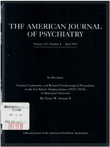Personality disorder in obsessive-compulsive volunteers, well comparison subjects, and their first-degree relatives
Abstract
OBJECTIVE: The authors sought to determine the frequency of DSM-III personality disorders in subjects with obsessive-compulsive disorder, well comparison subjects, and their first-degree relatives. METHOD: Thirty-two subjects with obsessive-compulsive disorder and 33 age- (within 5 years) and gender-matched well comparison subjects were assessed with the Structured Interview for DSM-III Personality Disorder and several self-report instruments. Their first-degree relatives were assessed in a blind manner with the same instruments. RESULTS: Subjects with obsessive-compulsive disorder were more likely than well comparison subjects to have a personality disorder, but compulsive personality was not the most frequent. No significant differences were found in the prevalence of personality disorders among first-degree relatives, including compulsive personality, or in obsessional, hysterical, or oral character traits. CONCLUSIONS: Personality disorders are highly prevalent among patients with obsessive-compulsive disorder, but the data do not support a relationship between obsessive- compulsive disorder and compulsive personality.
Access content
To read the fulltext, please use one of the options below to sign in or purchase access.- Personal login
- Institutional Login
- Sign in via OpenAthens
- Register for access
-
Please login/register if you wish to pair your device and check access availability.
Not a subscriber?
PsychiatryOnline subscription options offer access to the DSM-5 library, books, journals, CME, and patient resources. This all-in-one virtual library provides psychiatrists and mental health professionals with key resources for diagnosis, treatment, research, and professional development.
Need more help? PsychiatryOnline Customer Service may be reached by emailing [email protected] or by calling 800-368-5777 (in the U.S.) or 703-907-7322 (outside the U.S.).



